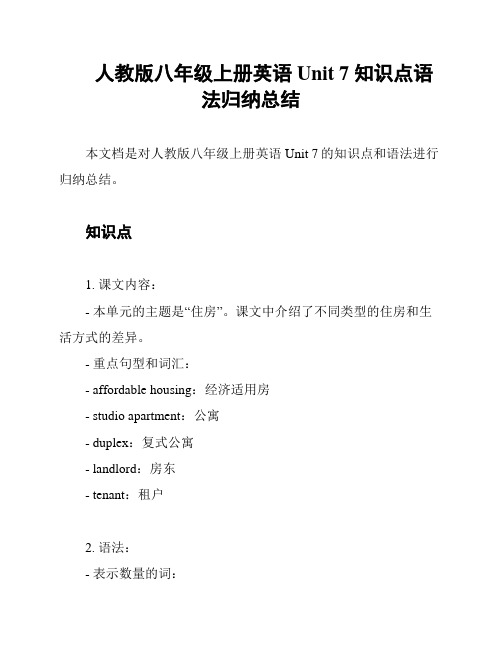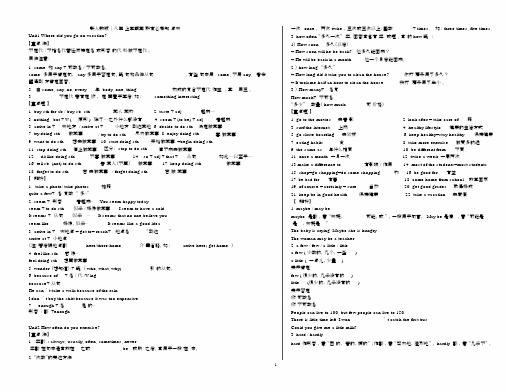人教版八年级英语上册重点语法及句型归纳.doc
人教版八年级(初二)英语上册第三单元必背课文、单词、重点短语与语法梳理汇总

八年级英语上册第三单元必背课文、单词、重点短语与语法梳理汇总一、必背课文2d 对话部分Julie: Did you like the singing competition yesterday, Anna?Anna: Oh, it was fantastic! Nelly sang so well!Julie: Well, I think Lisa sang better than Nelly.Anna: Oh, which one was Lisa?Julie: The one with shorter hair. I think she sang more clearly than Nelly.Anna: Yes, but Nelly danced better than Lisa.Julie: You can tell that Lisa really wanted to win, though.Anna: Well, everyone wants to win. But the most important thing is to learn something new and have fun.这篇对话围绕歌唱比赛展开,重点如下:-比较级和最高级的运用:通过比较不同选手的表现,大量使用了比较级(better, more clearly)和最高级(the most important),展示了两者在评价中的用法。
-表达观点的方式:使用“I think...”结构来阐述自己对选手表现的看法,体现了如何在讨论中发表个人观点。
二、必背单词1. outgoing ['aʊtɡəʊɪŋ] adj. 爱交际的;友好的;外向的例句:My brother is an outgoing boy.(我哥哥是个外向的男孩。
)2. both [bəʊθ] adj. & pron. 两个;两个都例句:Both of my parents are teachers.(我的父母都是老师。
人教版八年级英语核心语法考点归纳

人教版八年级英语核心语法考点归纳八年级上册Unit 1考点一:复合不定代词复合不定代词由some, any, no, every 与one, body, thing 构成。
在使用复合不定代词时应注意以下几点:1. some- 一般用于肯定句中,any- 一般用于否定句或疑问句中,在表示请求、建议或期望得到肯定回答时,常用some- 构成的复合不定代词;2. 复合不定代词作主语时按单数看待;3. 形容词或else 修饰复合不定代词的时候应后置。
考点二:一般过去时定义:一般过去时表示过去某个时间发生的动作或存在的状态,也可表示过去经常发生的习惯性的动作或行为。
结构:主语+ 动词过去式+ 其他;主语+was / were + 其他。
常用时见壮语:yesterday, two years ago, last week, just now 等。
1.The old man _____ in Shanghai, but he _____ in Haikou now.A.be born; liveB.was born ; liveC.is born; livesD.was born; lives2. —Where were you last Saturday?—I ____ in the Capital Museum.A. amB. will beC. wasD. have been八年级上册Unit 2考点一:拼读副词频度副词表示动作或行为发生的频率。
常见的频度副词及其发生的频率如下表:考点二:how 疑问词组练一练3.()do you usually go to school,Simon? -by bike.A.WhenB.HowC.WhatD.Where(答案在文末获取)八年级上册Unit 3考点一:形容词和副词的比较级形容词和副词的比较能表示两者之间的比较关系,表示A 比B 更……,通常用than 来连接。
人教版八年级上册英语Unit 7 知识点语法归纳总结

人教版八年级上册英语Unit 7 知识点语
法归纳总结
本文档是对人教版八年级上册英语Unit 7的知识点和语法进行归纳总结。
知识点
1. 课文内容:
- 本单元的主题是“住房”。
课文中介绍了不同类型的住房和生活方式的差异。
- 重点句型和词汇:
- affordable housing:经济适用房
- studio apartment:公寓
- duplex:复式公寓
- landlord:房东
- tenant:租户
2. 语法:
- 表示数量的词:
- some:一些(可数或不可数)
- any:任何(否定句或疑问句)
- many:许多(可数)
- much:许多(不可数)
- a lot of:许多(可数或不可数)
- a few:一些(可数)
- a little:一些(不可数)
- 情态动词can/can't:
- 表示能力、允许或不允许做某事。
- 肯定句结构:主语 + can + 动词原形- 否定句结构:主语 + can't + 动词原形
- 现在进行时:
- 表示正在进行的动作。
- 结构:主语 + am/is/are + 动词-ing 总结
本单元主要介绍了各种不同类型的住房以及表示数量的词、情态动词can/can't和现在进行时的用法。
通过研究这些知识点,我们可以更好地了解住房和生活方式的相关词汇和语法。
希望这份归纳总结对你的研究有帮助。
以上是对人教版八年级上册英语Unit 7知识点和语法的归纳总结。
祝你研究进步!。
人教版英语八年级上册全册重点句型汇总

人教版英语八年级上册全册重点句型汇总人教版课本初二上册重点句型大汇总Unit 1 Where did you go on vacation?1.——Where did you go on vacation?你到哪里去度假了?——I went to New York City.我去了纽约城。
2.——Did you go out with anyone?你出去带人吗?——No, No one was here. Everyone XXX.不,没有人在这儿。
大家度去度假了。
3.——Did you buy anything special?你买了什么特别的东西吗?——Yes, I bought something for my XXX.对,我给父亲买了一些东西。
4.——How was the food?食物怎么样?——XXX good.每样工具真的都好吃。
5.——Did everyone have a good time?人人玩的高兴吗?——Oh, yes. Everything XXX.对,一切都很精彩。
6.There was nothing much to do in the evening but read.早晨除念书之外无事可做。
Unit 2 How often do you exercise?1.I go to the movies maybe once a month.我大概一个月看一次片子。
2.——How often does he watch TV?他多久看电视一次?——XXX.他简直不看电视。
3.——Do you go shopping?你购物吗?——No, I never go shopping.不,我历来就不购物。
4.Here are the results.上面就是成效。
5.We found that only fifteen percent of our students XXX.我们发现仅仅百分之十五的学生每天锻炼。
最新人教版八年级英语上册复习要点(全册重点句型及语法)

最新人教版八年级英语上册复习要点(全册重点句型及语法)Unit 1 Where did you go on vacation?重点短语:(1)go on vacation 去度假(2)stay at home 呆在家(3)go to the mountains 去爬山(4)go to the beach去沙滩(5)visit museums 参观博物馆(6)go to summer camp 去夏令营(7)quite a few 相当多,不少(8)study for……为…而学习(9)go out 出去(10)most of the time 大多数时间(11)taste good 尝起来不错(12)have a good time过得愉快(13)feel like 感受到(14)go shopping 去买东西(15)in the past 在过去(16)walk around…..四处走走(17)too many 太多(18)because of+短语因为(19)one bowl of 一碗。
(20)find out 查明,弄清(21)take photos 照相(22)something important 重要的事情(23)up and down 上上下下(24)come up 上来(25)of course 当然(26)come down 下来重点语法:(1)Where did you go on vacation? I went to New York City.(2)Did you go out with anyone? No, No one was here. Everyone was on vacation.(3)Did you buy anything special? Yes, I bought something for my father. (4)How was the food? Everything tasted really good.(5)Did everyone have a good time? Oh,yes. Everything was excellent.习惯用法:(1)buy sth for sb./ buy sb. sth 为某人买某物(2)taste + adj. 尝起来……(3)nothing ….but + V.(原形)除了…之外什么都没有(4)seem + (to be) + adj 看起来(5). arrive in + 大地方arrive at + 小地方到达某地(6)decide to do sth. 决定做某事(7). try doing sth. 尝试做某事(8)try to do sth. 尽力做某事(9)try one`s best to do sth尽力做某事(10)enjoy doing sth. 喜欢做某事(11)want to do sth.想去做某事(12)start doing sth. 开始做某事(13)stop doing sth.停止做某事stop to do sth停下来做某事(14)look + adj 看起来(15)dislike doing sth. 不喜欢做某事(16)Why not do sth. 为什么不做…….呢?(17)so + adj + that + 从句如此…以至于第 1 页共 1 页(18)tell sb. (not) to do sth. 告诉某人(不要)做某事(19)keep doing sth. 继续做某事(20).forget to do sth. 忘记去做某事(未做)forget doing sth忘记做过某事(已做)词语辨析:○1anywhere 与somewhere两者都是不定副词。
新人教版八年级上册英语知识要点短语句型语法讲解(精华版)

初中英语八年级上册复习要点Unit 1 Where did you go on vacation?重点短语:(1)go on vacation 去度假(2)stay at home 呆在家(3)go to the mountains 去爬山(4)go to the beach去沙滩(5)visit museums 参观博物馆(6)go to summer camp 去夏令营(7)quite a few 相当多,不少(8)study for……为…而学习(9)go out 出去(10)most of the time 大多数时间(11)taste good 尝起来不错(12)have a good time过得愉快(13)feel like 感受到(14)go shopping 去买东西(15)in the past 在过去(16)walk around…..四处走走(17)too many 太多(18)because of+短语因为(19)one bowl of 一碗。
(20)find out 查明,弄清(21)take photos 照相(22)something important 重要的事情(23)up and down 上上下下(24)come up 上来(25)of course 当然(26)come down 下来重点语法:(1)Where did you go on vacation? I went to New York City.(2)Did you go out with anyone? No, No one was here. Everyone was on vacation. (3)Did you buy anything special? Yes, I bought something for my father.(4)How was the food? Everything tasted really good.(5)Did everyone have a good time? Oh,yes. Everything was excellent.习惯用法:(1)buy sth for sb./ buy sb. sth 为某人买某物(2)taste + adj. 尝起来……(3)nothing ….but + V.(原形)除了…之外什么都没有(4)seem + (to be) + adj 看起来(5). arrive in + 大地方arrive at + 小地方到达某地(6)decide to do sth. 决定做某事(7). try doing sth. 尝试做某事(8)try to do sth. 尽力做某事(9)try one`s best to do sth尽力做某事(10)enjoy doing sth. 喜欢做某事(11)want to do sth.想去做某事(12)start doing sth. 开始做某事(13)stop doing sth. 停止做某事stop to do sth 停下来做某事(14)look + adj 看起来(15)dislike doing sth. 不喜欢做某事(16)Why not do sth. 为什么不做…….呢?(17)so + adj + that + 从句如此…以至于(18)tell sb. (not) to do sth. 告诉某人(不要)做某事(19)keep doing sth. 继续做某事(20).forget to do sth. 忘记去做某事(未做)forget doing sth 忘记做过某事(已做)词语辨析:○1anywhere 与somewhere 两者都是不定副词。
(完整版)人教版八年级上册英语知识点汇总.docx

新人教版|八年上学期英所有必考知点大Unit1 Where did you go on vacation?【重点法】不定代:不指名代替任何特定名或形容的代叫做不定代。
用法注意:1. some 和 any + 可数名 / 不可数名。
some 多用于肯定句, any 多用于否定句、疑句和条件从句。
有些句中用 some, 不用 any,者希望得到方肯定回答。
2.由 some, any, no, every与 body, one, thing构成的复合不定代作主,其用三。
3.不定代若有定修,定要置于其后:如:something interesting【重点短】1. buy sth for ab./ buy sb. sth某人某物2. taste + adj.起来⋯⋯3. nothing...but + V.(原形 )除了⋯⋯之外什么都没有4. seem + (to be) + adj看起来5. arrive in +大地方 / arrive at +小地方到达某地6. decide to do sth. 决定做某事7. try doing sth. 做某事/ try to do sth.尽力做某事 8. enjoy doing sth.喜做某事9. want to do sth.想去做某事10. start doing sth.开始做某事 =begin doing sth.11. stop doing sth.停止做某事区分: stop to do sth.停下来去做某事12.dislike doing sth.不喜做某事14. so + adj + that +从句如此⋯⋯以至于⋯⋯16. tell sb. (not) to do sth.告某人(不要)做某事17. keep doing sth.做某事18. forget to do sth.忘去做某事 / forget doing sth忘做某事【辨析】1. take a photo/ take photos拍照quite a few+ 名复数“ 多⋯”2. seem + 形容看起来⋯ ... You seem happy today.seem + to do sth.似乎 / 好像做某事I seem to have a coldIt seems + 从句似乎 .. ⋯.It seems that no one believe you.seem like ...好像,似乎⋯ ..It seems like a good idea.3. arrive in +大地点 = get to= reach+地点名“到达 ...... ”arrive at + 小地点(注:若后跟地点副here/there/home,介需省略,如:arrive here; get home )4. feel like sth感像⋯feel doing sth.想要做某事5. wonder (想知道) + 疑( who, what, why)引的从句。
八年级英语上册单元重点语法汇总(人教版)

八年级英语上册单元重点语法汇总(人教版)八年级英语上册单元重点语法汇总重点语法:heredidyougoonvacation?IenttoNeyorcity.Didyougooutithanyone?No,Nooneashere.Everyoneasonvac ation.Didyoubuyanythingspecial?yes,Iboughtsoethingforyfat her.Hoasthefood? Everythingtastedreallygood.Dideveryonehaveagoodtie?oh,yes.Everythingasexcellent.习惯用法:buysthforsb./buysb.sth为某人买某物taste+ad尝起来……nothing….but+V.除了…之外什么都没有see++adj 看起arrivein+大地方arriveat+小地方到达某地decidetodosth. 决定做某事trydoingsth.尝试做某事trytodosth.尽力做某事tryone`sbesttodosth尽力做某事enjoydoingsth.喜欢做某事anttodosth. 想去做某事startdoingsth.开始做某事stopdoingsth.停止做某事stoptodosth停下来做某事loo+adj看起disliedoingsth.不喜欢做某事hynotdosth.为什么不做…….呢? so+adj+that+从句如此…以至于tellsb.todosth.告诉某人做某事eepdoingsth.继续做某事forgettodosth.忘记去做某事forgetdoingsth忘记做过某事。
- 1、下载文档前请自行甄别文档内容的完整性,平台不提供额外的编辑、内容补充、找答案等附加服务。
- 2、"仅部分预览"的文档,不可在线预览部分如存在完整性等问题,可反馈申请退款(可完整预览的文档不适用该条件!)。
- 3、如文档侵犯您的权益,请联系客服反馈,我们会尽快为您处理(人工客服工作时间:9:00-18:30)。
1、不定代词
A. 形容词修饰不定代词时,要后知,做后置定语。
I’ll tell you something interesting.
B. 不定代词做主语时,谓语动词用第三人称单数。
Everyone is here.
2、一般过去时 :在一般过去式的句子中,要注意不规则动词过去式的形式与拼写,
要牢记一般过去时的时间状语。
I went to the cinema yesterday. / He hurt his foot last night.
3、频度副词: 在使用频度副词时,要注意频度副词在句子中的位置是:置于be
动词/情态动词/助动词之后,置于实意动词之前,而且对频度副词疑问要用 how
often。
He always sits in the front of the classroom. / I am never late for school.
------How often do you watch TV?
-----Every night.
4、形容词、副词的比较等级
A. Than 是比较级的标志词,than前的形容词或副词要用比较级。
He is taller than me.
B. 有比较范围(如: in 或 of 短语)时,用最高级。
He is the tallest of the three boys.
C. 形容词最高级前必须加定冠词the.
I’m the best student in my class.
D. 不规则变化的形容词、副词的比较等级要记牢。
He plays the piano worst.
5、动词不定式
A. 跟动词不定式作宾语的常用动词要记牢。如:agree (同意); offer (提出);
intend, plan (打算,计划); demand, ask (要求); promise (答应); help (帮
忙); prepare (准备); decide (决定); refuse (拒绝);dare (敢于); choose (选
择); wish,hope,want, expect ,would like (希望,想要); fail ;(不能;忘
记); pretend (假装); manage (设法); determine (决心)。
记忆口诀:同意提出做计划, 要求答应来帮忙。 准备决定遭拒绝, 敢于选择有
希望。 不能做到莫假装, 设法做成决心坚。
He would like to go with you.
B. 要注意区分某些动词跟动词不定式和动名词所表达的不同意义,如 stop doing
和 stop to do 的区别。 既能接不定式,又能接动词-ing 形式,但意思不同的动
词或词组: 即“四'记’”“力争”“不、后悔”。四“记”指“记得、记住
(remember)”;“忘记(forget)”“计划、打算(mean)”;“继续(go
on)”;力争指“try”;“不”“后悔”指stop与regret。 He was too tired and
stopped to have a rest.
6、一般将来时
A. 要注意一般将来时的构成:be going to do 和 will do.
I’m going to have a party.
B. 一般将来时的时间状语: next month / week / ....., in + 时间段, tomorrow
等。
I’ll fly to Shanghai tomorrow.
C. 注意there be 结构的将来时为: There is / are going to be......或 There will
be.....
There will be a meeting next week. /
There are going to be some new desks in your classroom tomorrow.
7、可数名词和不可数名词
A. 注意名词的分类, 可数名词有单、复数之分,而不可数名词则没有复数形式。
There are many people in the park.
B. 记住名词变复数的规则及特殊名词的复数形式。
He has three children.
C. much,(a) little 用于修饰不可数名词,many, (a)few 用于修饰可数名词复数;
some, any,lots of (a lot of) 既可以修饰可数名词,也可以修饰不可数名词。
There is little milk in the cup. / Can you give me some water?
7、can 表示邀请的用法: can 是情态动词, 它在表示邀请时,要注意它的各种
回答, 尤其是肯定回答:Sure / Yes, I’d love to. 句中的 to 不可去掉。
----Can you come to my party?
----Yes,/ Sure, I’d love to. / Sorry, I’m afraid not. I have to ......
8、 含有if 引导的条件状语从句的主从复合句。
在使用含有if 引导的条件状语从句的主从复合句时,要注意时态问题,记住:当
主句是一般将来时或是含有情态动词的句子或祈使句时,if 从句用一般现在时。
I’ll help you if you tell me. / If you work hard, you may do better. /
If you want to open the door, pree the red button.
重点句型:
1. How often 引导的特殊疑问句及其答语
How often do you exercise? Once/ sometimes/ never.....
2. 由than 构成的比较级的句子 I’m more outgoing than my sister.
3. As....as 构成的同级比较的句子。He works as hard as you.
4. 比较等级的特殊疑问句
The more, the better. / The weather gets hotter and hotter. /
He is the tallest boy in my class = He is taller than any other boy in my class.
5. 疑问词 + 动词不定式 They are talking about when to have a party.
6. 表示“看法” 的句型 -
---What do you think of the movie?
-----I don’t mind it. / I love watching it.
I think you’ll have a great time. / I don’t think he will go to the party.
7. “ want to be + 名词 :表示“想成为......”
------What do you want to be when you grow up?
----- I want to be an engineer.
8. be going to do sth 打算、计划做某事,表示将来
I’m going to have a picnic on Sunday. / He isn’t going to play the piano at the
party.
There is going to be a party next week.
9. will do 将要做.... 表示将来
----What will the future be like?
----Cities will be more polluted.
-----Will people use money in 100 years?
----Yes, they will. / No, they won’t.
There will be more trees in the park.
10. how many / much 引导的特殊疑问句
how many 用于提问可数名词的复数; how much 用于提问不可数名词的数量或价
钱。
How many people are there in your family? / How much milk is there in the
bottle?
----How much is the coat?
---- Fifty yuan.
11. Can 表示邀请
----Can you come to my party?
----Sure, I’d love to. / Sorry, I’m afraid not. I have to look after my sister.
12. If 引导的条件状语从句。
If you go to the party, you’ll have a great time.
If we have it today, half the class won’t come.
13. Should 表示义务和责任。
Should we ask people to bring food?
I think you should go to college.
